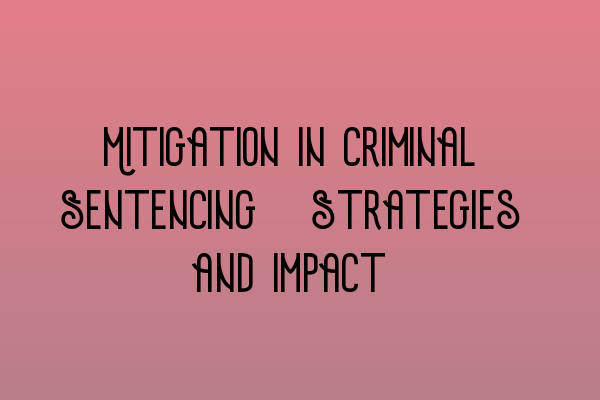Mitigation in Criminal Sentencing: Strategies and Impact
When it comes to criminal sentencing, mitigation plays a critical role in determining the outcome of a case. Mitigation refers to actions or circumstances that can reduce the severity of punishment for a criminal offense. In this blog post, we will explore various strategies and their impact on criminal sentencing.
Understanding Mitigation
Mitigation can be categorized into two types: factual mitigation and legal mitigation. Factual mitigation involves presenting evidence or information that highlights the defendant’s positive character traits, the presence of remorse, or any other factors that may explain or justify the defendant’s actions. Legal mitigation, on the other hand, focuses on legal arguments that can mitigate the severity of punishment based on legal principles or statutory provisions.
Strategies for Effective Mitigation
1. Character references: Character references from employers, friends, family members, or community members can be powerful evidence in demonstrating the defendant’s positive contributions to society, strong moral character, or previous good conduct.
2. Expressing remorse: Demonstrating genuine remorse for the offense committed can significantly impact the judge’s perception of the defendant. Apologizing to the victim and showing a willingness to make amends can go a long way in mitigating the sentence.
3. Cooperation with authorities: Providing significant assistance to law enforcement agencies or cooperating fully with the investigation can be considered as a mitigating factor. This cooperation demonstrates the defendant’s willingness to take responsibility for their actions and aid in the pursuit of justice.
4. Mitigating circumstances: Identifying and presenting any mitigating circumstances that may have influenced the defendant’s behavior can be a powerful argument. These could include mental health issues, challenging life circumstances, or duress.
5. Rehabilitation plans: If appropriate, presenting a well-prepared rehabilitation plan can show the court that the defendant is committed to making positive changes in their life and reducing the likelihood of reoffending.
Impact of Mitigation on Sentencing
Mitigation can have a significant impact on the sentencing outcome. By presenting strong and compelling mitigation, the court may choose to impose a more lenient sentence, such as a reduced prison term, a community-based sentence, or even probation. The effectiveness of mitigation depends on several factors, including the strength of the evidence presented, the defendant’s criminal history, the severity of the offense, and the judge’s discretion.
It’s important to note that mitigation does not guarantee a lesser sentence, as the court has the ultimate discretion to determine the appropriate punishment. However, skilled legal representation can maximize the chances of a favorable outcome.
In conclusion, mitigation plays a crucial role in criminal sentencing by presenting evidence and legal arguments that can reduce the severity of punishment. Strategies such as character references, expressing remorse, cooperating with authorities, identifying mitigating circumstances, and presenting rehabilitation plans can all contribute to a more favorable outcome. However, the ultimate decision lies with the court, and skilled legal representation is essential in maximizing the chances of a successful mitigation strategy.
